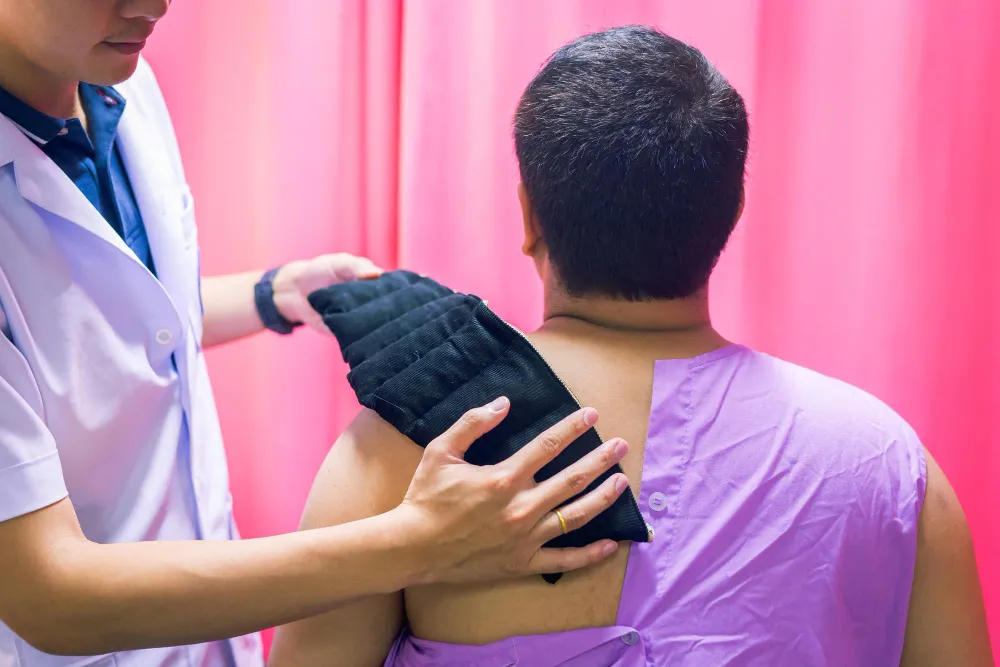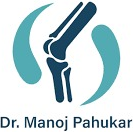Frozen Shoulder Treatment in Nagpur
Get lasting relief from shoulder pain and stiffness with advanced treatments & expert orthopedic care.
Frozen Shoulder Comprehensive Care by Dr. Manoj Pahukar
Frozen shoulder, also known as adhesive capsulitis, is a condition characterized by pain, stiffness, and restricted movement in the shoulder joint. It commonly affects people between 40 to 60 years of age and is more prevalent among individuals with diabetes or those recovering from shoulder injuries. Without proper treatment, frozen shoulder can severely impact daily activities, causing discomfort and immobility.
For expert frozen shoulder treatment in Nagpur, Dr. Manoj Pahukar provides advanced orthopedic care, ensuring effective pain relief and full recovery through personalized treatment plans.

Causes of Frozen Shoulder
The causes of frozen shoulder are linked to conditions or situations that limit shoulder mobility and trigger inflammation. Understanding these causes helps in early diagnosis and effective treatment planning, preventing long-term stiffness.
Frozen shoulder occurs when the shoulder joint capsule thickens and tightens, restricting movement. Common causes include:
- Prolonged Shoulder Immobility - Post-surgical recovery, fractures, or prolonged bed rest.
- Diabetes - Increased risk due to changes in collagen structure.
- Thyroid Disorders - Hypothyroidism or hyperthyroidism can contribute to stiffness.
- Shoulder Injuries & Trauma - Rotator cuff injuries, fractures, or post-stroke complications.
- Autoimmune Diseases - Inflammatory conditions affecting joint function.
Symptoms of Frozen Shoulder
Frozen shoulder develops gradually and progresses in stages, making it important to recognize symptoms early. The condition limits shoulder function, affects daily activities, and can worsen if left untreated. Identifying these signs helps in timely medical intervention.
Frozen shoulder progresses through three stages, each lasting several months:
- Freezing Stage - Gradual increase in pain and stiffness, making movement difficult.
- Frozen Stage - Reduced pain but extreme stiffness, restricting arm movement.
- Thawing Stage - Gradual improvement in mobility as stiffness decreases.
Common symptoms include:
- Persistent shoulder pain, especially at night.
- Stiffness making simple tasks like dressing or lifting difficult.
- Limited range of motion in the shoulder.
- Pain that worsens over time without treatment.
Advanced Frozen Shoulder Treatments by Dr. Manoj Pahukar
Frozen shoulder treatment is tailored according to the stage and severity of the condition. Dr. Manoj Pahukar combines modern techniques with a patient-first approach, starting with non-surgical methods and using surgery only when necessary for long-term recovery.
Non-Surgical Treatments
Medications
- Pain relievers and anti-inflammatory medicines are prescribed to reduce swelling, ease discomfort, and make it easier to carry out daily activities without constant pain.
Physiotherapy & Stretching Exercises
- Customized exercise programs focus on improving flexibility, strengthening the shoulder muscles, and gradually restoring full range of motion.
Corticosteroid Injections
- Steroid injections directly into the joint help relieve inflammation and pain quickly, allowing patients to progress better with physiotherapy sessions.
Hydrodilatation Therapy
- A specialized non-surgical procedure where sterile fluid is injected into the shoulder joint to expand and loosen the capsule, improving mobility.
Hot & Cold Therapy
- Alternating between ice packs and heat applications helps in reducing stiffness, minimizing pain, and relaxing the muscles around the shoulder.
Lifestyle Modifications
- Simple adjustments like avoiding prolonged immobility, correcting posture, and maintaining an active routine can significantly speed up recovery.
Surgical Treatments (For Severe Cases)
Arthroscopic Shoulder Release
- A minimally invasive procedure using a small camera and instruments to carefully remove adhesions inside the shoulder joint and restore movement.
Manipulation Under Anesthesia (MUA)
- Performed under anesthesia, the surgeon gently moves the shoulder in controlled directions to break adhesions and regain flexibility.
Joint Capsule Release Surgery
- In rare and severe cases, surgery is performed to cut and release the tightened joint capsule, providing lasting improvement in mobility and pain relief.
Why Choose Dr. Manoj Pahukar for Frozen Shoulder Treatment in Nagpur?
Choosing the right specialist is crucial for recovering from frozen shoulder effectively. Dr. Manoj Pahukar brings years of orthopedic expertise, advanced techniques, and a patient-focused approach to ensure faster recovery with long-term relief.
- Expert Orthopedic Specialist - Extensive experience in treating shoulder conditions.
- Advanced Treatment Techniques - Offering both non-surgical and surgical options.
- Minimally Invasive Procedures - Faster recovery and reduced hospital stays.
- Personalized Rehabilitation Plans - Ensuring a full return to normal activities.
- Patient-Centered Care - Tailored treatment for maximum recovery.
Dr. Manoj Pahukar’s expertise and compassionate approach make him a trusted choice for frozen shoulder treatment in Nagpur, helping patients regain pain-free mobility and a better quality of life.
Recovery & Rehabilitation
Recovery after frozen shoulder treatment focuses on regaining full mobility, reducing pain, and restoring daily function. A structured rehabilitation program ensures safe and effective improvement.
- Regular Physiotherapy - Guided exercises to improve mobility.
- Pain Management - Proper use of medications and therapies.
- Post-Treatment Care - Avoiding strain and maintaining an active lifestyle.
- Follow-Up Appointments - Monitoring progress and preventing recurrence.
With consistent care and guided rehabilitation, patients can expect a gradual return to full shoulder function and improved quality of life.
Frozen shoulder can be effectively treated with expert care. If you’re experiencing shoulder pain and stiffness, Dr. Manoj Pahukar provides the best frozen shoulder treatment in Nagpur, ensuring a smooth recovery.
Restore Comfort and Strength in Your Shoulder
Don’t let frozen shoulder hold you back. Receive advanced care in Nagpur from Dr. Manoj Pahukar to regain movement and improve your quality of life.
Frequently Asked Questions
How long does it take to recover from frozen shoulder treatment?
Recovery depends on the severity of the condition and the treatment type. Non-surgical treatments usually show improvement in a few weeks to months, while surgical interventions may require a few months of rehabilitation to regain full motion.
Can physical therapy alone cure frozen shoulder?
Physical therapy is highly effective in improving mobility and reducing pain, especially in early stages. However, severe or persistent cases may require additional interventions like injections or arthroscopic release.
Is frozen shoulder treatment painful?
Mild discomfort is common during exercises or after injections, but treatments are designed to minimize pain. Pain management techniques, including medications and gentle therapy, are used to ensure comfort.
Are there any risks associated with arthroscopic shoulder release?
Risks are minimal but may include infection, stiffness, nerve injury, or bleeding. Proper surgical technique and post-operative care significantly reduce these risks.
How soon can I return to normal activities after frozen shoulder treatment?
Light daily activities can usually resume within a few days to weeks after non-surgical treatments. After surgery, return to regular activities generally takes several weeks, depending on rehabilitation progress.
Will frozen shoulder come back after treatment?
Recurrence is rare, especially if patients follow prescribed exercises and avoid prolonged immobility. Maintaining shoulder flexibility and strength is important for prevention.
Can frozen shoulder affect both shoulders?
Yes, though it usually starts in one shoulder. People with diabetes or certain medical conditions are at higher risk of developing it in both shoulders.
Are corticosteroid injections safe for frozen shoulder?
Basic movement usually returns within a few weeks, but complete strength and range of motion can take a few months with regular physiotherapy.

